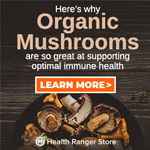
Large cohort study confirms vitamin D as a powerful weapon against lung cancer
Wednesday, September 18, 2013 by: Ethan A. Huff, staff writer
Tags: vitamin D, lung cancer, cohort study
- Newly released JFK files reveal Pentagon's role in creating Lyme disease and covid in the same lab
- Discovery of vast underground city beneath Giza pyramids challenges human history
- Black cumin seed oil emerges as a powerful ally against breast cancer and chronic inflammation
- Sugar-free deception: Artificial sweeteners hijack hunger signals, fuel obesity epidemic, study warns
- Kiss Your Genetic Privacy Good-Bye! 23andMe Gets Green Light to Sell Your Intimate Genetic Details to Anyone They Want
- Catastrophic 7.7 earthquake devastates Myanmar and Thailand; death toll could reach 100,000
- AI breakthrough slashes celiac disease diagnosis time from months to minutes
- Europe braces for WAR as EU urges citizens to STOCKPILE FOOD, in latest provocations with Russia
- Aluminum pollution: A silent threat to human health
- Thomas Massie’s Dual Loyalty Disclosure Act aims to restore American sovereignty by cracking down on foreign influence in Congress
- Dr. Suzanne Humphries makes bombshell appearance on Joe Rogan podcast, exposing vaccine industry deception back to POLIOMYELITIS
- The cancer fear industry: How big pharma profits from panic-and what natural alternatives offer
- The mighty Eggplant: An underrated superfood with ancient roots
- 200 Tesla showrooms bracing for Saturday protests as movement against Musk escalates
- Is the vaccine-autism debate reopening? Washington Post sparks controversy with preemptive hit piece on David Geier
- A handful of pecans a day could keep heart disease at bay, study finds
- Sweden's migrant crisis deepens as failed green energy venture leaves thousands jobless, exposes systemic collapse
- The great crypto power struggle: How technocrats and governments are reshaping global finance
- Newly released JFK files reveal Pentagon's role in creating Lyme disease and covid in the same lab
- Analysis: The coming economic collapse, a mass uprising and Trump's three secret weapons to halt the growing revolt
- Trump nominates VACCINE ZEALOT Susan Monarez to lead the CDC, sidelining RFK Jr.'s reform efforts
- Trump's greatest betrayal so far: Accelerating Middle East wars, silencing dissent, and serving Zionist masters
- Dr. Mike Yeadon releases 15-minute testimony - WATCH - about genocidal intent of COVID “vaccines”
- Festive flavors: The sweet history, nutritional profile and health benefits of pecan pie
- Elon Musk: Aliens could be here on Earth RIGHT NOW
- Big Pharma's $8 Billion bribery scheme exposed: how doctors are pushed to prescribe junk science, not heal
- 5 Simple steps to boost your brainpower: How to strengthen executive function in a distracted world
- Trump reverses course on Gaza plan, says “nobody is expelling Palestinians”
- A lack of integrity in Academia: Harvard professor found GUILTY of fraudulent research to promote CRT theory
- Reclaim your health: How midlife exercise reverses years of inactivity
- Survival 101: Effective EMF blocking techniques
- Florida takes a stand: DeSantis proposes permanent ban on mRNA vaccine mandates
- Sugarcane extract superior to cholesterol-lowering drugs?
- California's social media censorship law struck down: A victory for free speech or a threat to online safety?
- OpenAI whistleblower who dissented against how the company trained ChatGPT found dead
- EPA advisor admits the agency is funneling billions to climate groups ahead of Trump’s return to White House
- EPA advisor admits the agency is funneling billions to climate groups ahead of Trump’s return to White House
- Newly released JFK files reveal Pentagon's role in creating Lyme disease and covid in the same lab
- California's social media censorship law struck down: A victory for free speech or a threat to online safety?
- Dr. Mike Yeadon releases 15-minute testimony - WATCH - about genocidal intent of COVID “vaccines”
- The Health Ranger releases “Vaccine Zombie” song and music video, using AI-animated zombies for the music video
- The pandemic as a tool for INDOCTRINATION: Understanding “The Indoctrinated Brain” by Dr. Michael Nehls
- Florida takes a stand: DeSantis proposes permanent ban on mRNA vaccine mandates
- “Why we influenced the 2020 elections”: Facebook files reveal the coordinated effort to bury the Hunter Biden laptop story
- Mike Adams releases country western hit single: Goin’ Back in Time is Comin’ Home
- Mike Adams releases music poetry sensation: A Child of God
- Unpacking the Lies That We’ve Been Fed – new song and music video released by Mike Adams, the Health Ranger
- Michigan sheriff announces criminal investigation into 2020 election crimes, Dominion Voting Systems
- Migrants are taking advantage of recent hurricanes to scam residents and loot their homes
- House Intelligence Committee calls for the ARREST and PROSECUTION of Dr. Anthony Fauci
- RFK Jr. clears key hurdle: Sen. Susan Collins backs controversial HHS nominee, signaling a new era for health policy
- Rep. Nancy Mace introduces bill to ban biological males from female facilities on federal property
- Peter Rost exposes Big Pharma corruption in his book “The Whistleblower: Confessions of a Healthcare Hitman”
- Mike Adams releases new song and music video: Nothing More Disgusting Than a Globalist
- Red Cross issues warning to stop blood plasma donations from vaccinated people
- Scientists confirm: GENIUS brain function can be spontaneously unleashed in humans without any apparent cause
- EPA advisor admits the agency is funneling billions to climate groups ahead of Trump’s return to White House
- HYSSOP: What research reveals about the health benefits of this ancient holy herb
- Two containers with completed ballots fall out of truck in Florida
- Fully vaccinated about to see “tsunami” of illness and death, warns virologist
- Global leaders unite to clamp down on “misinformation” with UN-backed Cascais Declaration
- BREAKING: 2025 NDAA authorizes mandatory military draft of WOMEN across America… as Pentagon pursues global NUCLEAR war with both Russia and China at the same time
- Michael Yon warns of a ZIONIST TAKEOVER in Trump’s second administration
- BOMBSHELL: DNA testing kits are a SCAM to develop ethnic-specific bioweapons
- Ozempic and Wegovy weight loss drugs are injectable LIZARD VENOM PEPTIDES that may unleash a devastating wave of organ failure… side effects align with symptoms of SNAKE BITES
- Israeli soldiers accused of even more torture and abuse in the West Bank
- These 13 countries just signed an agreement to engineer a global FAMINE by destroying food supply
- NASA admits that climate change occurs because of changes in Earth’s solar orbit, and NOT because of SUVs and fossil fuels
- RFK Jr. clears key hurdle: Sen. Susan Collins backs controversial HHS nominee, signaling a new era for health policy
- Sermon 30: How Jesus reveals Caesar’s FAKE CURRENCY and FALSE AUTHORITY
- Coriander seeds: Ancient medicine backed by modern science
- Arizona officials claim Maricopa County needs 10-13 days to tabulate results of the election
Utilizing data collected as part of the comprehensive Women's Health Initiative (WHI), a large-scale cohort study involving more than 128,000 postmenopausal women, researchers from the Fred Hutchison Cancer Research Center, the University of Washington, and the University of California, Los Angeles, Medical Center looked specifically at lung cancer rates in conjunction with intake levels of vitamin D among participating women. Intake levels of both calcium and vitamin A in the form of retinol were also evaluated.
To obtain this information, questionnaires were distributed that compiled data both on dietary and supplemental intake of vitamin D, as well as calcium and retinol, among participating women. From this, the research team evaluated lung cancer rates -- a total of 1,771 women came down with lung cancer during the WHI cohort -- in conjunction with vitamin intake levels to see if there was any correlation between the two that might be indicative of causation.
In the end, total vitamin intake levels above 400 IU, and especially above 800 IU, were very clearly associated with significant reductions in lung cancer rates, which makes sense, as previous studies have found that high vitamin D intake can remediate and prevent other forms of cancers as well. As reported by the Vitamin D Council, a prominent vitamin D advocacy and research group, taking both calcium and vitamin D together can also elicit a powerful anti-cancer effect, as long as intake levels of vitamin A in the form of retinol are below 1,000 IU per day.
"Researchers believe that if you take too much vitamin A in retinol form, it may negate any benefit in taking vitamin D and calcium, particularly for lung cancer," explains the Vitamin D Council.
Stick with vitamin A carotenoids rather than retinol to obtain maximum health benefits from vitamin D
As we here at NaturalNews have previously reported, vitamin A should always be consumed in carotenoid forms like beta carotene, which is prominently found in carrots and sweet potatoes, as these natural forms are converted by the body into just the right amount of retinol. Retinol, on the other hand, when taken directly in too high amounts has been shown to actually inhibit the effects of vitamin D and other nutrients in the body, as illustrated by this new study."The crux of the problem is that a form of vitamin A, retinoic acid, weakly activates the vitamin D response element ... and perhaps blocks vitamin D's more robust activation," stated Dr. John Jacob Cannell, M.D., the current Executive Director of the Vitamin D Council, in a report published by the British Medical Journal back in 2010.
Still, the primary point of the new study is that vitamin D, when taken in high doses with appropriate levels of other co-factors, can help reduce the risk of lung cancer. And this, of course, is great news for the general public, as vitamin D from natural sunlight is freely available for all, and supplemental vitamin D3 when natural sunlight is unavailable is quite affordable and easy to access.
Sources for this article include:
http://www.vitamindcouncil.org
http://www.ncbi.nlm.nih.gov
http://www.naturalnews.com
http://science.naturalnews.com
Vitamin D at FETCH.news
Get independent news alerts on natural cures, food lab tests, cannabis medicine, science, robotics, drones, privacy and more.
Take Action: Support Natural News by linking to this article from your website
Permalink to this article:
Embed article link: (copy HTML code below):
Reprinting this article:
Non-commercial use OK, cite NaturalNews.com with clickable link.
Follow Natural News on Facebook, Twitter, Google Plus, and Pinterest
Science News & Studies
Medicine News and Information
Food News & Studies
Health News & Studies
Herbs News & Information
Pollution News & Studies
Cancer News & Studies
Climate News & Studies
Survival News & Information
Gear News & Information
News covering technology, stocks, hackers, and more



"Big Tech and mainstream media are constantly trying to silence the independent voices that dare to bring you the truth about toxic food ingredients, dangerous medications and the failed, fraudulent science of the profit-driven medical establishment.
Email is one of the best ways to make sure you stay informed, without the censorship of the tech giants (Google, Apple, Facebook, Twitter, YouTube, etc.). Stay informed and you'll even likely learn information that may help save your own life."
–The Health Ranger, Mike Adams













































